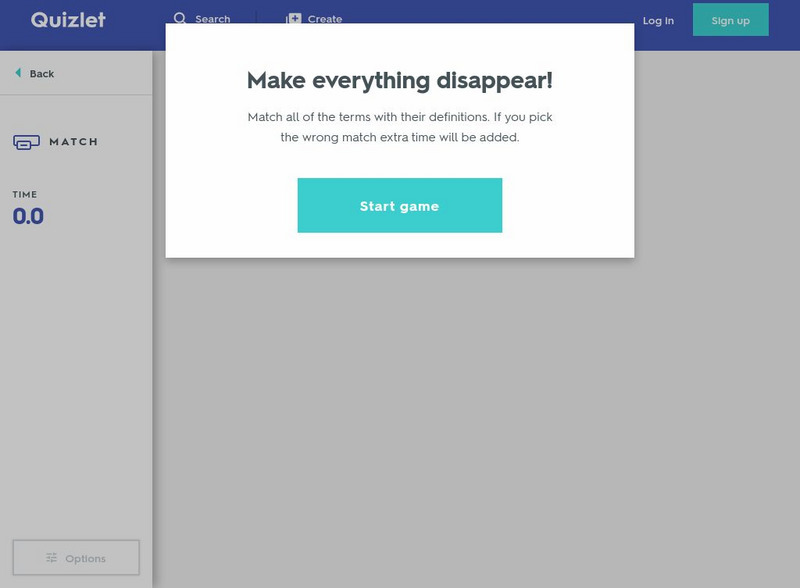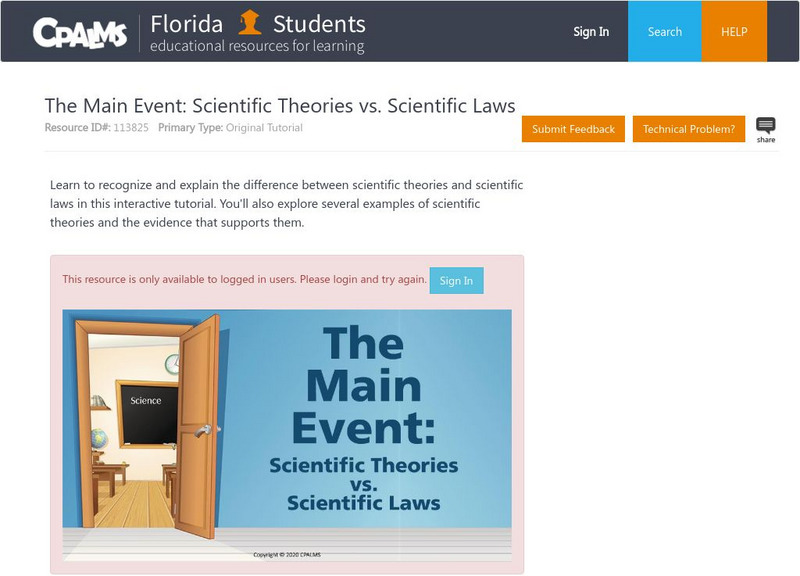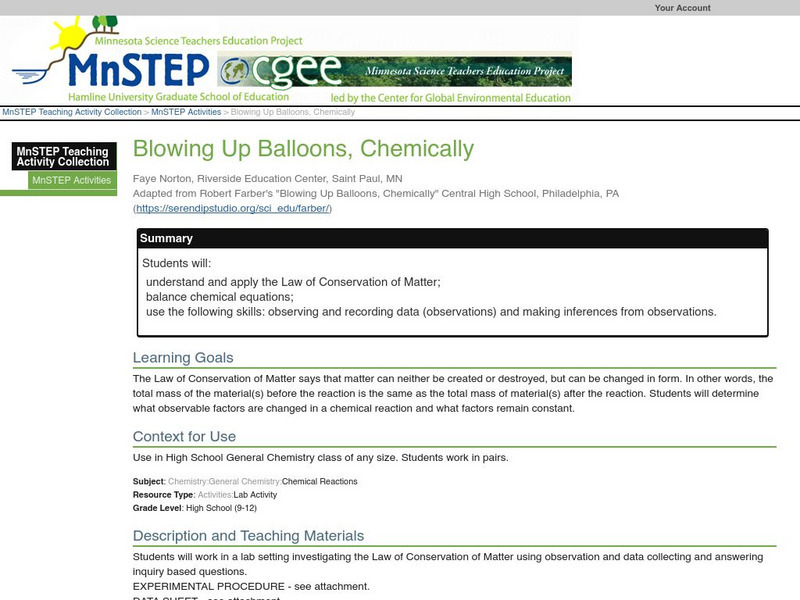Hi, what do you want to do?
Curated OER
IT - Lesson Plan
Tenth graders should appreciate the importance of Information Technology in our daily life.
Curated OER
Cycles Review
Eighth graders discuss the four major cycles of matter. In this general science lesson plan, 8th graders decide which of the four is the most important. They share their opinion in class.
Curated OER
Introduction to Biomes
Eighth graders identify the different kinds of biomes. In this life science lesson, 8th graders explain their importance in an ecosystem. They take a BrainPop quiz at the end of the lesson..
CPALMS
Florida State University Cpalms: Florida Students: Observation vs. Inference
A tutorial that explores the differences between scientific observation and scientific inference.
Quizlet
Quizlet: Making Observations and Inferences Test
A test with four multiple choice questions over inferencing, quantitative observation, and qualitative observation.
National Geographic
National Geographic: Observing Physical and Cultural Landscapes
In this lesson, students examine photographs of Europe as they learn to distinguish between physical and cultural characteristics of a landscape, and make observations and inferences about the places and people in the photographs. They...
Quizlet
Quizlet: 5th Grade: Observation vs. Inference: Proficient: Flashcards
This set of interactive flashcards focuses on observation and inference. It provides a list of terms with definitions and some examples.
Huntington Library
Huntington Library: Learning From Leaves: From Observation to Inference [Pdf]
A lesson plan in which learners explore plants from three different ecosystems and make inferences about plant structures and their environments. Includes discussion questions, a vocabulary glossary, and handouts.
Quizlet
Quizlet: Making Observations and Inferences: Flashcards
A set of vocabulary practice flashcards over observations and inferences.
Quizlet
Quizlet: 5th Grade: Observation vs. Inference Proficient: Test
This interactive assessment features 6 multiple-choice questions over the terms observation, inference, and prediction with their definitions and examples.
Quizlet
Quizlet: 5th Grade: Observation vs. Inference Proficient: Match
In this interactive game, students match the terms observation, inference, and prediction with their definitions and examples.
Quizlet
Quizlet: Making Observations and Inferences: Match
Play this match game with four vocabulary terms and definitions over making observations.
Utah Education Network
Uen: Chances With Wolves
This lesson engages students in learning the differences among observations, facts, and inferences. Students will study about the reintroduction of wolves into the Rocky Mountain and Yellowstone Region. Students will work in small groups...
Texas Education Agency
Texas Gateway: Question and Purpose
This tutorial reviews over making observations to form questions and purpose for a lab experiment.
Science Education Resource Center at Carleton College
Serc: Floating Foods and Underwater Eruptions: An Exploration of Density
Learners explore the concept of density by investigating how several solids and liquids interact. Through hands-on activities and a teacher demonstration, they develop a greater understanding of density by using their observational...
National Endowment for the Humanities
Neh: Edsit Ement: Fable and Trickster Tales Around the World
The lessons presented in this website "introduce children to folk tales" and how these folktales are changed and affected by generational and cultural values. Includes several links to further related information on folktales, fables,...
Curated OER
Mc Graw Hill: 4th Grade Use Details and Examples
This reference from the McGraw-Hill CCCS Literacy eHandbook discusses the importance of recalling explicit details. The importance of inferencing skills with a how-to graphic organizer for making inferences are included. Students may...
Smithsonian Institution
Smithsonian Learning Lab: Every Picture Has a Story
Smithsonian Education presents "Every Picture Has a Story". Teachers can download this comprehensive teaching package in which learners examine some of the millions of photographs in the Smithsonian. This amazing teaching package comes...
Science Education Resource Center at Carleton College
Serc: Investigating South Crow River: Discharge, Turbidity, Erosion, Sediments
In this field investigation, small groups of learners will observe and measure characteristics of the South Crow River near Mayer, Minnesota. Data collection on these characteristics will include but not be limited to: speed of current...
CPALMS
Florida State University Cpalms: Florida Students: Scientific Laws and Theories
Differentiate between scientific laws and theories. Identify examples of scientific theories and use evidence to support them.
Science Education Resource Center at Carleton College
Serc: Blowing Up Balloons, Chemically
Students will understand and apply the Law of Conservation of Matter; balance chemical equations; use the following skills: observing and recording data (observations) and making inferences from observations.
Science Education Resource Center at Carleton College
Serc: Investigating the Difference in Geology
In this inquiry based field investigation, students will be observing our school campus's topography, soil, and plants and comparing them with the Fertile sand dunes' topography, soil, and plants. They will make detailed observations and...
Texas Education Agency
Texas Gateway: Descriptive vs. Comparative Investigations
In the following lesson students will learn the differences between descriptive and comparative investigations.
National Institutes of Health
Alcohol: Separating Fact From Fiction
Young scholars can use this site to observe the effects of alcohol on mice and discuss the ways in which alcohol harms and impairs the body. An online lesson, "Alcohol; Separating Fact From Fiction," has students watch video clips,...












![Huntington Library: Learning From Leaves: From Observation to Inference [Pdf] Lesson Plan Huntington Library: Learning From Leaves: From Observation to Inference [Pdf] Lesson Plan](https://static.lp.lexp.cloud/images/attachment_defaults/resource/large/FPO-knovation.png)













